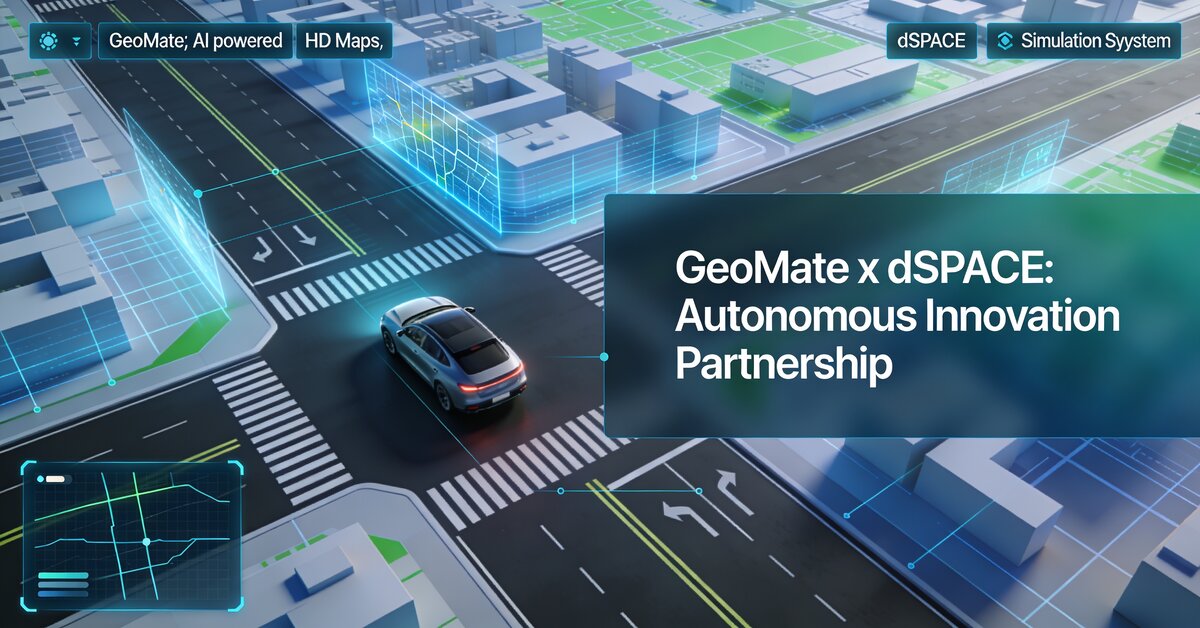GeoMate and dSPACE have announced a strategic partnership to drive the development of advanced driver assistance systems (ADAS) and autonomous driving (AD) technologies. By combining their expertise, the two companies aim to accelerate advancements in autonomous driving by broadening operational design domains (ODDs) and enhancing simulation accuracy.
The collaboration brings together GeoMate’s OpenDRIVE-compliant, high-definition (HD) maps and highly automated 3D models with dSPACE’s renowned simulation ecosystem, creating a comprehensive solution for developers and engineers working in autonomous vehicle (AV) technology. GeoMate’s innovative mapping solutions, rooted in artificial intelligence, provide highly compact HD maps that deliver both cost-efficiency and high performance. These HD maps, integrated into dSPACE’s simulation platforms, will allow developers to conduct virtual test drives that mimic real-world conditions, leveraging high-resolution geographical data and environmental fidelity.
According to Dr. Nastaran Saberi, CTO of GeoMate, “GeoMate’s AI-driven approach is transforming the way HD maps are developed, enabling autonomous and ADAS systems to access more compact and detailed geographic information quickly and cost-effectively.” The company’s HD maps are known for their consistency and reliability, traits essential for simulating real-world driving scenarios in a controlled, virtual environment. This precision and accuracy not only enhance development processes but also significantly reduce the time needed to prepare autonomous systems for deployment.
Michael Kluge, Product Manager for scenarios at dSPACE, emphasized the benefits of integrating GeoMate’s advanced mapping solutions into dSPACE’s simulation products. “The seamless integration of GeoMate’s comprehensive, highly detailed maps into our Aurelion and ASM simulation tools enhances our customers’ ADAS and AD capabilities by expanding their validation and sensor simulation options,” Kluge noted. With this integration, dSPACE clients can enjoy a more immersive simulation experience that includes enhanced fidelity and realism in road and environmental features, an essential aspect of validating ADAS and AD functionalities in complex scenarios.
One of the standout features of the GeoMate-dSPACE partnership is the implementation of GeoMate’s OpenDRIVE format within dSPACE’s simulation ecosystem. OpenDRIVE is a widely recognized standard that provides semantic data on road elements, lane structures, and intersections, which are crucial for accurately modeling the complexities of real-world driving environments. Integrating OpenDRIVE-compliant data means that autonomous driving systems can benefit from greater consistency across different test platforms, fostering a seamless workflow for developers who require interoperability between software tools and AV platforms.
Through this collaboration, dSPACE’s Automotive Simulation Models (ASM) and Aurelion sensor simulation tools will benefit significantly from the addition of GeoMate’s compact, AI-driven HD maps. These maps not only ensure efficient memory usage but also present a comprehensive view of real-world environments, including geographic accuracy and topographical features. The ASM and Aurelion tools, which are integral to dSPACE’s verification and validation offerings, will now provide a more robust foundation for testing and validating autonomous vehicle functions within virtual settings.
For AV developers, this enhanced simulation capability is crucial, as it allows for extensive scenario-based testing that helps improve sensor accuracy and object detection performance. In scenarios such as urban driving or high-speed highway navigation, where rapid responses to environmental changes are necessary, GeoMate’s detailed 3D models help validate and test these responses effectively. Reality-based 3D models integrated within dSPACE’s simulation software ensure that developers can identify and address potential issues during the validation phase, thereby streamlining the path to commercialization for ADAS and autonomous technologies.
Ultimately, the GeoMate-dSPACE partnership is set to strengthen the AD and ADAS ecosystem, providing developers with more reliable, detailed, and accessible resources to support the rapid progression of autonomous driving. With a strong focus on creating realistic testing environments, this collaboration is paving the way for a new era in AV validation and is poised to help make autonomous technology safer and more reliable.







